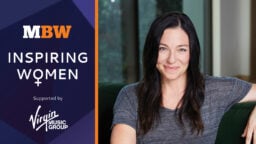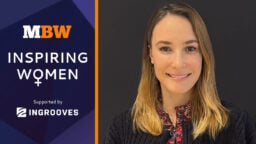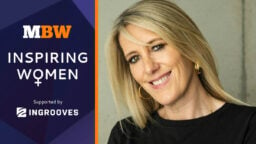MBW’s Inspiring Women series profiles female executives who have risen through the ranks of the business, highlighting their career journey – from their professional breakthrough to the senior responsibilities they now fulfill. Inspiring Women is supported by Ingrooves Music Group.
In Alicia Keys’ memoir, More Myself, her personal sound engineer, head of music, business partner and friend Ann Mincieli is described as a fellow “sky’s-the-beginning-visionary.” It’s not hard to find confirmation of that within Mincieli’s work.
That vision can be seen in her innovative approach to engineering — a skill she’s constantly learning more about after over 20 years in the business — and as owner of state-of-the-art Jungle City Studios in New York, which boasts the best in both vintage and modern technology.
She’s also a strategic partner in She is the Music — an initiative created alongside Keys which helps women break in at every level in the music world.
As an engineer, Mincieli has worked with a host of huge artists including Jay-Z, Drake, Mariah Carey, Usher, Outkast, Jennifer Hudson, Kanye West and Whitney Houston.
And alongside Keys, she helped orchestrate the star-studded opening of the 2019 Grammys, which saw Lady Gaga, Jennifer Lopez, Jada Pinkett Smith and Michelle Obama take to the stage to offer a message of female empowerment.
Mincieli’s relationship with Keys began in ’97 when she was an assistant engineer at Quad Studios in Times Square. Back then, Keys was a young artist under development at Sony who was writing for others and recording vocals in the closet of her then producer and boyfriend’s Harlem apartment.
Mincieli says: “Alicia’s style of producing and who she wants to be as an artist is the style of engineer that I wanted to be. We wanted to use old ways of recording, bringing musicians in and playing in the same room together. I also wanted to dive into old sounds and mix new sounds together and that was the common ground with her.”
“Alicia’s style of producing and who she wants to be as an artist is the style of engineer that I wanted to be.”
Since that first meeting, they’ve gone from working in basements in home studios to travelling the world working in huge studios, to building one of their own. (Keys bought the two buildings that mirror Jungle City and moved her own Oven Studios from Long Island to the new space.)
Mincieli adds: “We went from basement to baseball fields together. We complement each other and collaborate. And my understanding of the industry year by year, even on the business side of things, has allowed our relationship to flourish.”
As a 14-year-old music lover, Mincieli started out playing guitar in bands before being drawn to the technical side after discovering the variety of roles and opportunity for education in the studio.
She studied at the Institute of Audio Research then going onto work at Quad Studios where she was exposed to the creative process of artists like Tupac, Bon Jovi, Mariah Carey, Metallica, Nas and Biggie Smalls.
During lockdown, Mincieli has been working on Keys’ upcoming album Alicia, (safely) flying between LA and New York to record in isolation while doing promo including live streams for the likes of Amazon, Stephen Colbert, Verizon and BET.
Here, we chat to her about working with artists in the studio, lessons learned across her career and why she’d like to see more collaboration in the industry.
What’s the role of an engineer?
To know all the technical aspects of working in any studio around the world. Also, how to create the vibe, be quick and keep the flow of the session, but be very technical at the same time.
What have you learned from working with Alicia Keys specifically?
I’ve always admired how she never compromises the creativity on a track. She is fair and fights for the best outcome for the music. Alicia works on music, 24/7. Other artists may go in and work on 15 or 20 songs and I probably have 150 songs recorded right now for this album. They’re all in the vault. She’s constantly making music.
She’s inspired me to keep growing and to keep learning as she does the same. Even with her own musical skills, which is something that I admire a lot, and her deep dive into learning the gear and being technical. It’s really impressive.
“Mine and Alicia’s goal has always been; if we can’t help each other grow equally, then we have to move on. And that’s never been the case — we’ve always been able to help each other grow equally.”
ann mincieli
She does everything from writing to arranging, and when it comes to technology, she’s very hip to everything from the traditional things like TV and PR, to how do we convert social media followers to customers.
Mine and Alicia’s goal has always been; if we can’t help each other grow equally, then we have to move on. And that’s never been the case — we’ve always been able to help each other grow equally.
More generally, how do you approach working with artists and producers in the studio?
I try to do a lot of research and preparation. These days it’s really easy — you can Google lots of videos and see what gear they’re using. I also try to hit up the producer or the artist ahead of time and see what gear and tech they need to make them comfortable.
Every artist works a different way so I try to understand and grasp how they work and how they communicate quickly so you keep the flow.
When we’re in the studio, sometimes you have to learn on the fly. Even little things like how they communicate and what words they use, or how many bars they want to roll back and record from.
If you learn that quick, that’s key. My approach is to listen and then really try to understand and relate to their needs from me as an engineer.
What are your most memorable sessions, albums, or artists that you’ve worked on or with and why?
Definitely the As I Am record for Alicia. We worked on it for 15 months. We had some incredible producers on it, from Linda Perry to Mark Batson to Jack Splash, to Kerry Brothers — a long time collaborator of Alicia. That’s one of my favorite records because we really dove into the sonic palette of making production and art.
One of my favorite sessions was the song called You Don’t Know My Name by Alicia with Kanye West. It was such an incredible time. We started at Quad Studios where a young Kanye was struggling on Def Jam for them to pay for his first music video. He was so excited and passionate about his music — that’s what I always remembered about him. Kanye was a good friend.
“We worked with kanye west when he was transitioning from being a producer to an artist. I give him a lot of credit for making that transition, which is very, very hard.”
He worked on a lot of music and production for Jay-Z and a lot of artists at the time. We worked with him when he was transitioning from being a producer to actually being an artist. I give him a lot of credit for making that transition, which is very, very hard.
For You Don’t Know My Name, we recorded some strings at the old Hit Factory in New York. It was just incredible to mix this old soulful song, hip hop and an artist like Alicia with some really incredible string players. I feel like that is a real once in a lifetime moment.
Kanye has evolved hugely from that time as an artist into a very public figure over the last couple of decades. What do you make of that transition into the person that he is today?
I try to focus on his music. I always consider him to be a musical genius, no matter what type of music he’s making. I understand that artists want to evolve — sometimes it’s always not about sales, it’s about personal growth. I respect that from him.
A lot of people always say, ‘Well, what about old Kanye music?’ But you evolve from that. He’s been around 15/17 years now and his music has evolved and he’s evolved as a person.
I try not to pay too much attention to a lot of the things that are being said. I think that with social media these days, a lot of this stuff is amplified in the wrong ways and criticized. I try to stay focused on the positive and the music and what he’s doing.
He has a great musical team led by Mike Dean and a bunch of other folks. I look at some of the artists that he’s working on and developing and it’s pretty inspiring.
What are the biggest lessons that you’ve learned across your career?
Always try to be humble, try to be a student of the game and know that you’re not always going to know everything. The best thing that I learned is it’s okay to say to your engineer or your producer, ‘I don’t know this piece of gear, or I don’t know this software, but I’m going to grab the manual and learn it,’ as opposed to trying to hit a button or trying to use the software and you either make a mistake or you erase something. We’re not going to know everything in the room sometimes but I think that’s a big fear for an engineer or producer.
Don’t put yourself in a box. Learn every aspect of the industry; study the analytics, study the data and learn everything from the artists you’re working with at the time, to where the industry is in general, what labels are doing better than others and what positions are available. Learn everything.
“We outgrow things and you have to keep climbing. What I learned from this industry is don’t be a camper, always be a climber.”
For myself, I turn down certain work now because I want to give myself a day or two off. Sometimes I let another engineer come in and engineer on the easier days because we’re all in this for the long haul. Taking care of yourself, putting yourself first; I’ve had to learn that the hard day.
Then, find your passion, and if you’re not passionate about something anymore, it’s okay. You can move on to another area of the industry that you feel more passionate about. We outgrow things and I think you have to keep climbing. What I learned from this industry is don’t be a camper, always be a climber.
What would you change about the music industry and why?
I would love it to be a hybrid of pre-technology and post-technology. In some instances, I would love for people to go back in a room and make music together. I think the vibe of sitting in a room and playing… you see those videos from the ’60s and Motown of artists, writers and players playing in a room together.
A lot of times [nowadays] the artists are disconnected to the producers, writers and engineers and people are phoning stuff in. Someone’s making a drum track 3,000 miles away. Some of the new technology has definitely hindered the industry.
But I’m seeing it come back full circle. I’m seeing labels make music studios again, which is pretty incredible. In the ’60s and ’70s with RCA and Sony, they all had their own studios. You’re seeing that come back again with Universal, Sony, Warner and Atlantic Records.
I would also love to see artists go back and study the whole foundation of music. Don’t just put a record together so quickly where you don’t go study — look at some of the old concepts and old gear that we used and create a hybrid.
“the label has a lot of incredible staff members and connections that can be helping you build your strategies, your roadmaps, your promo. I think it’s important to make them feel part of the record.”
What frustrates me these days is the budgets and when there’s a disconnection between the label and artists. It’s almost like an artist has their own standalone team but there needs to be more unity between the labels and the artists.
It seems like an artist will finish a record and submit it, and the label has a lot of incredible staff members and connections that can be helping you build your strategies, your roadmaps, your promo. I think it’s important to make them feel part of the record. Alicia is really good at that. I wish all artists would do that — they’re your partners at the end of the day.
What do you make of the transition to streaming?
A minor thing that bothers me the most is not seeing your whole album package. Streaming frustrates me a lot. I feel like artists need to be paid more — the labels need to fight the DSPs to get more money.
The labels caught up to the technology too late and that frustrated me. They could have been the Spotify and the Napsters at the time but they let a third party come in so quickly. Then all of a sudden, these artists weren’t getting paid for many years. We had to fight to get a half a penny a stream.
Those numbers need to be fleshed out and be fair. The streaming companies need to pro-rate the stuff — if I’m playing four artist albums per month and that’s all I’m playing, and I’m paying $9.99 a month, you need to pro-rate that and give more to the artists that I’m listening to. That’s when it would be really equal.
“streaming royalties need to be fleshed out and be fair. The streaming companies need to give more to the artists that I’m listening to. That’s when it would be really equal.”
What are your future ambitions and plans?
I’m working on something exciting with Sony Music right now that will be unveiled soon. Aside from that, I want to continue learning. I want to continue to evolve into more production and more writing. I want to continue to study the analytics and data of our industry and continue to help Alicia build the roadmap of her next two to three albums that all tie into each other.
I want to continue my work with She is the Music. Myself, Jody Gerson, Alicia and Sam Kirby have worked hard on this initiative, and we’ve made tremendous progress in the last year of giving women opportunity. I want to continue to promote and give women of all colour opportunity in the industry.
Being the entrepreneur that I am, my next goal is to build the Jungle City of LA. I really want to do that, and to keep the music industry growing as a whole.
I love to work with our management company, which is Roc Nation, who have got an incredible all-star team, and just continue to build and evolve with Alicia and with them. To figure out what the landscape is in our industry and continue to figure out the twists and turns of all of it.





